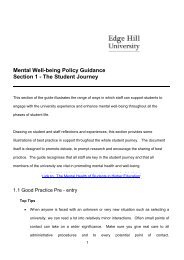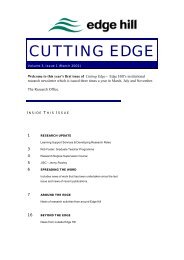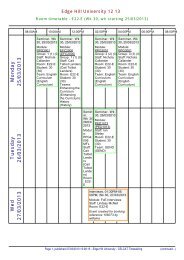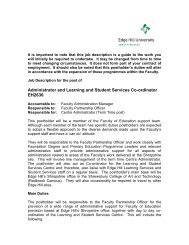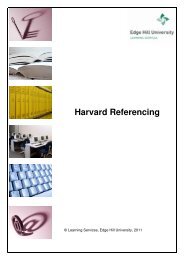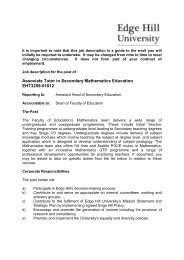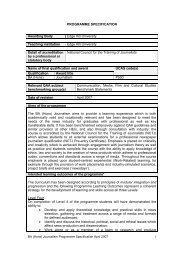Teaching, Learning and Mentoring Practice - Edge Hill University
Teaching, Learning and Mentoring Practice - Edge Hill University
Teaching, Learning and Mentoring Practice - Edge Hill University
Create successful ePaper yourself
Turn your PDF publications into a flip-book with our unique Google optimized e-Paper software.
Work Based <strong>Practice</strong><br />
Module TMP1001 Work Based <strong>Practice</strong> runs as a thread throughout Level 4<br />
<strong>and</strong> accumulates 20 credits. It helps to link together all the learning that takes<br />
place at Level 4.<br />
The Work Based <strong>Practice</strong> module is based on the Higher Level <strong>Teaching</strong><br />
Assistant St<strong>and</strong>ards (HLTA) but this does not mean that students are<br />
automatically awarded HLTA. You need to apply for HLTA via your Local<br />
Authority. Students who already hold HLTA status are exempt from TMP<br />
1001, 1002 <strong>and</strong> CYP 1003.<br />
In TMP 1001 <strong>and</strong> TMP 1002 you will engage learners in reflective practice<br />
<strong>and</strong> develop an ability to be analytical <strong>and</strong> evaluative. The work based<br />
practice module provides the core of a Professional Development Portfolio.<br />
The work-based practice element is the driver that underpins the central<br />
philosophy of the learning <strong>and</strong> teaching rationale for the programme. <strong>Learning</strong><br />
should be active <strong>and</strong> realisable in vocational terms.<br />
Work-based practice is a mechanism for learning. Within this context, it is<br />
centred on:<br />
• Reflection on work practices. It is about acquiring knowledge <strong>and</strong> a set<br />
of technical skills <strong>and</strong> it is about reviewing, learning from experience<br />
<strong>and</strong> setting targets for further development.<br />
• Action <strong>and</strong> problem solving within a working environment, centred on<br />
live projects <strong>and</strong> challenges to individuals <strong>and</strong> organisations. Workbased<br />
learning also sees the creation of knowledge as a shared <strong>and</strong><br />
collective activity, one in which people discuss ideas <strong>and</strong> share<br />
problems <strong>and</strong> solutions.<br />
• The acquisition of new knowledge <strong>and</strong> meta-cognition.<br />
9



